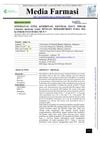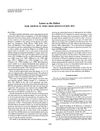 1461 citations,
March 2004 in “Annals of oncology”
1461 citations,
March 2004 in “Annals of oncology” Pegylated liposomal doxorubicin is as effective as conventional doxorubicin but causes fewer heart problems and side effects.
 522 citations,
January 2001 in “Cancer investigation”
522 citations,
January 2001 in “Cancer investigation” Doxil is an effective, modified chemotherapy drug with a unique toxicity profile and shows promise in treating certain cancers.
[object Object]  108 citations,
December 2003 in “Clinical breast cancer”
108 citations,
December 2003 in “Clinical breast cancer” PLD is an effective and safer alternative for treating breast cancer.
76 citations,
March 2005 in “Cancer Research” Doxorubicin can block blood vessels from hair follicles, reducing skin tumor growth.
 53 citations,
June 1982 in “The BMJ”
53 citations,
June 1982 in “The BMJ” Cooling the scalp below 22°C before and during chemotherapy can help prevent hair loss.
 49 citations,
October 1994 in “Annals of Oncology”
49 citations,
October 1994 in “Annals of Oncology” Minoxidil not effective in preventing chemotherapy-induced hair loss.
19 citations,
June 2022 in “Molecular therapy. Nucleic acids” A specific RNA, circNlgn, contributes to heart damage and scarring caused by the cancer drug doxorubicin.
 17 citations,
January 2019 in “Journal of cancer”
17 citations,
January 2019 in “Journal of cancer” The formula YH0618 can reduce the harmful side effects of the chemotherapy drug Doxorubicin and protect healthy cells.
 12 citations,
December 1987 in “Cancer Chemotherapy and Pharmacology”
12 citations,
December 1987 in “Cancer Chemotherapy and Pharmacology” Vitamin E in the diet might help protect against hair loss caused by the chemotherapy drug doxorubicin in rabbits.
 11 citations,
June 2012 in “Archives of Dermatological Research”
11 citations,
June 2012 in “Archives of Dermatological Research” L-cystine and vitamin B6 at high doses prevented hair loss in mice treated with a chemotherapy drug.
 9 citations,
April 2021 in “Evidence-based complementary and alternative medicine”
9 citations,
April 2021 in “Evidence-based complementary and alternative medicine” Guilu Erxian Glue may help reduce chemotherapy side effects like weight loss and heart stress.

YH0618 helps reduce chemotherapy-induced hair loss by targeting specific proteins and pathways.
 January 2023 in “Discovery medicine”
January 2023 in “Discovery medicine” Cepharanthine helps reduce cell aging caused by the cancer drug Doxorubicin by boosting cell cleanup processes.
October 2006 in “Clinical Cancer Research” Antioxidants can block the cancer-fighting effects of doxorubicin.
 63 citations,
February 2013 in “Human cell”
63 citations,
February 2013 in “Human cell” PEGL-DOX causes Hand-Foot Syndrome due to skin reactions from prolonged circulation and ROS generation.
5 citations,
January 2014 in “Advances in bioscience and biotechnology” Natural honey protects against Doxorubicin's harmful effects.
27 citations,
January 2018 in “Drug Delivery” GC10/DOX hydrogel shows promise as an effective thyroid cancer treatment.
102 citations,
October 2010 in “Molecular Pharmaceutics” Copper-doxorubicin nanoparticles effectively treat tumors with less toxicity.

PEGylated liposomal doxorubicin improves cancer treatment effectiveness and reduces side effects like heart damage and hair loss.
 168 citations,
December 1986 in “Cancer Chemotherapy and Pharmacology”
168 citations,
December 1986 in “Cancer Chemotherapy and Pharmacology” Epirubicin is as effective as doxorubicin for cancer treatment with less heart damage, but doesn't work on doxorubicin-resistant cancers.
[object Object]  October 2024 in “Media Farmasi”
October 2024 in “Media Farmasi” Combining soursop leaf extract with doxorubicin may improve breast cancer treatment and reduce side effects.
 279 citations,
June 1990 in “Journal of Clinical Oncology”
279 citations,
June 1990 in “Journal of Clinical Oncology” Adding chemotherapy to tamoxifen improves survival for older breast cancer patients with positive nodes.
 153 citations,
January 2001 in “Science”
153 citations,
January 2001 in “Science” Using CDK inhibitors on rats showed a reduction in chemotherapy-caused hair loss, but later experiments could not repeat these results.
 81 citations,
February 2000 in “Anti-cancer drugs”
81 citations,
February 2000 in “Anti-cancer drugs” Doxil showed some effectiveness against advanced prostate cancer but caused severe side effects at higher doses.
 60 citations,
June 1997 in “Drugs & Aging”
60 citations,
June 1997 in “Drugs & Aging” Mitoxantrone with a corticosteroid helps manage symptoms for some advanced prostate cancer patients but doesn't extend life.
 53 citations,
May 2001 in “The American journal of the medical sciences”
53 citations,
May 2001 in “The American journal of the medical sciences” Chemotherapy can cause various skin problems, and recognizing them helps improve patient care.
45 citations,
July 2006 in “Journal of Investigative Dermatology” Chemotherapy affects blood vessels in hair follicles, not stem cells, allowing hair regrowth.
 39 citations,
January 1994 in “European Journal of Cancer”
39 citations,
January 1994 in “European Journal of Cancer” Scalp cooling is largely ineffective in preventing hair loss from breast cancer chemotherapy.
 25 citations,
August 1992 in “In vitro cellular & developmental biology”
25 citations,
August 1992 in “In vitro cellular & developmental biology” The new system can grow hair in the lab and test hair growth treatments.
 12 citations,
July 2014 in “Journal of Investigative Dermatology”
12 citations,
July 2014 in “Journal of Investigative Dermatology” Chemotherapy causes complex changes in hair follicle cells that can lead to hair loss.






















